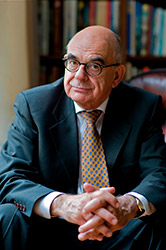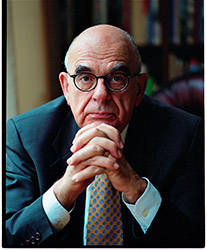About Myself
- Profile
- International Development Cooperation
- Sudan
- Social Democracy
- Professional activities
- Personal
- Photos
Profile
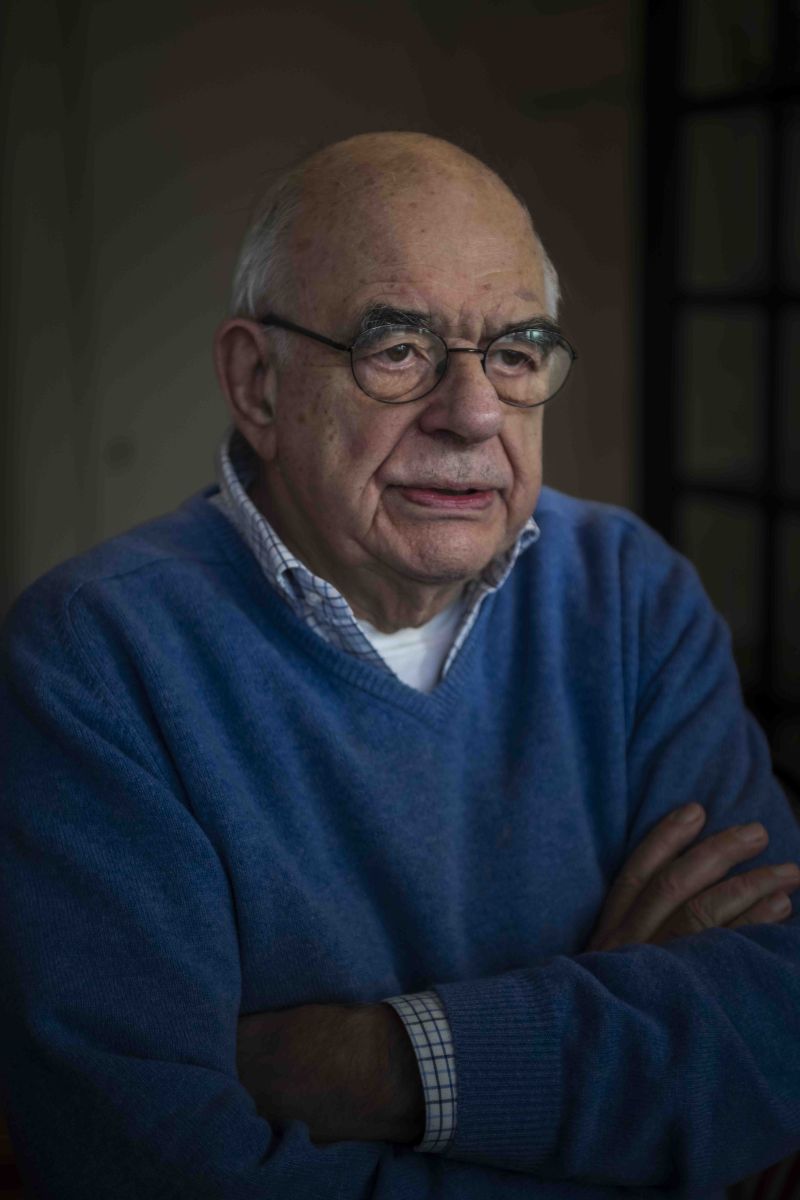 I was born in 1940 (March 16) in Scheveningen. My nationality is Dutch. Both my father and my grandfather were born in Scheveningen as well. Both had the same name: Jan Pronk. My mother, Elisabeth van Geel, was born in Sewoe Galoer, Indonesia. Her father, Pieter van Geel, worked as chartered accountant. Both my father and my mother and also my brother Piet and my sister Liesbeth, were primary schoolteachers.
I was born in 1940 (March 16) in Scheveningen. My nationality is Dutch. Both my father and my grandfather were born in Scheveningen as well. Both had the same name: Jan Pronk. My mother, Elisabeth van Geel, was born in Sewoe Galoer, Indonesia. Her father, Pieter van Geel, worked as chartered accountant. Both my father and my mother and also my brother Piet and my sister Liesbeth, were primary schoolteachers.
I studied at a grammar school in The Hague, hesitated to follow a university study in classical languages, history or mathematics and finally chose economics at the Netherlands School of Economics (NEH, presently: Erasmus University) in Rotterdam. This I never did regret, on the contrary. My main professor was Jan Tinbergen, who in 1969 was awarded, together with Ragnar Frisch, the first Nobel Prize in economics. At that time, I had joined his team of researchers at the same university. I worked seven years as his research assistant and gave lectures on development economics. In those years I took part in activities of various non-governmental organizations in the field of development and peace. I was a youth delegate to the General Assembly of the World Council of Churches (Uppsala, 1968).
In those years I developed political activities and joined the Dutch Labour Party (Partij van de Arbeid, PvdA), the social democratic party of the Netherlands. (www.pvda.nl).
photo: Anke van der Meer
International Development Cooperation
In 1971 I was elected as member of Parliament in the Netherlands where I became spokesperson on issues concerning international development cooperation. I also was secretary of a commission (led by Sicco Mansholt) which had the task to draw political conclusions for the Netherlands on the basis of the findings of the Club of Rome (“Limits to Growth”).
Two years later I was appointed to be Minister for International Development Cooperation in the Cabinet (Joop) Den Uyl. In that period, I presided over the negotiations about a New International Economic Order (NIEO) at the 7th Special Session of the UN General Assembly. I participated in the negotiations on the independence of the former Dutch colony Surinam (1975) and chaired the Intergovernmental Group on Indonesia (IGGI) which had been established to coordinate development assistance to Indonesia, another former Dutch colony, independent since 1945.
In 1978 I returned to parliament. In the same year I was appointed Professor Theory and Practice of International Development at the International Institute of Social Studies (ISS) in The Hague www.iss.nl . During that period, I was member of an international commission, chaired by Willy Brandt, which published a report on international development issues: North-South. A Programme for Survival.
In 1980 I left parliament in order to take the position (under Gamani Corea) as Deputy Secretary General of the United Nations Conference of Trade and Development (UNCTAD). In that capacity I was responsible, amongst others, for the negotiations on an action program for the Least Developed Countries (LLDC). Other agenda items were, inter alia, world commodity policies, international finance for development, restructuring of debts, transfer of technology and South-South cooperation.
Six years later I returned to Dutch politics and was again elected to parliament. From 1989 until 2002 I served another three terms as Cabinet minister, twice with the portfolio of International Development Cooperation in the third cabinet of (Ruud) Lubbers and the first cabinet of (Wim) Kok. During those years I took part in international efforts to prevent escalation of conflicts in various countries (e.g., Afghanistan, Bosnia, Eritrea, Ethiopia, Liberia, Rwanda, Somalia, Sudan), providing humanitarian aid, assistance to refugees and the rehabilitation of war-torn areas. In 1992 I had to step down as Chairman of the IGGI due a dispute with President Suharto after a massacre by Indonesian military in East Timor. Development aid to Surinam, which had been halted after a coup in 1980 and the killing of opponents of dictator Bouterse in 1982 was resumed after a return to democracy several years later. In Sudan I participated in mediation efforts between the Government and the Sudanese Peoples Liberation Movement (SPLM). After the genocides in Rwanda (1994) and Bosnia (Srebrenica, 1995) I took part in international efforts to provide assistance to the victims and their families and to enable return of refugees and rehabilitation of war-torn areas.
My fourth position was Minister for Environment and Spatial Planning in cabinet Kok 2. In 2000 and 2001 I presided over the United Nations World Climate Negotiations: the 6th Conference of Parties (CoP 6). These resulted in a binding international agreement to limit greenhouse gasses emissions: the Kyoto Protocol of the UN Framework Convention on Climate Change.
I left Dutch politics in 2002. Following the presentation of a report on the responsibility of the Netherlands government for the failure of Dutch UN Blue Helmets to protect the Bosniak people of Srebrenica against genocide by the Serbs, the cabinet led by Wim Kok stepped down. Shortly thereafter my party, was defeated at national elections. Though I kept my seat in Parliament, I decided to step down in order to make room for representatives of a new generation.
Sudan
In 2004 I was appointed by UN Secretary General Kofi Annan as his Special Representative in Sudan, residing in Khartoum. In that capacity I led the UN peace keeping mission in Sudan (UNMIS), until the end of 2006. (See: https://unmis.unmissions.org) Early 2005 a peace agreement was signed in Nairobi between North and South Sudan, which brought an end to a civil war that had lasted more than two decades, at the time the longest civil war in Africa with the highest number of casualties. Monitoring this Comprehensive Peace Agreement (CPA) was the main part of the mandate of the mission.
One year earlier in Darfur, West Sudan, another civil war had started between the Government of Sudan and a number of rebel movements, including the Sudan Liberation Movement (SLM). People in Sudan fell victim to a genocide, orchestrated by Arab militia, called Janjaweed. Part of our mandate was the coordination of humanitarian assistance to the people of Darfur, many of which were living in camps for refugees and displaced persons, and the facilitation of a peace agreement for Darfur.
The mission did consist of 10.000 military (in addition to 7.000 military sent by the African Union to Darfur) and 4.000 civilians. I worked together with two deputies, Taye Zerihoun (Ethiopia) and Manuel Aranda da Silva (Mozambique) and with Force Commanders General Fazle Elahi Akbar (Bangladesh) and Jasbir Lidder (India). Beyond monitoring peace and security, the mandate of UNMIS included return of refugees and displaced persons, disarmament and demobilization of combatants, reintegrating them into society, demining, reconstruction and economic development, capacity building, monitoring of human rights, preparing elections and a referendum six years after independence.
In 2006 negotiations in Abuja, Nigeria, resulted in a provisional peace agreement on Darfur. However, the Sudanese army continued attacking villages in Darfur, killing civilians. When I criticized this violation of the peace agreement, the Government of Sudan declared me persona non grata. I had to leave the country end 2006 and stepped down as UN Special Representative. During my stay in Sudan, I have kept a weblog. (See this website: Weblog/English)
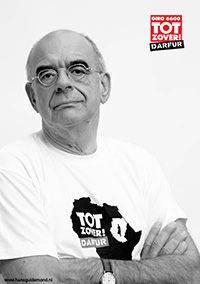
Social Democracy
I returned to The Netherlands and resumed my position at the ISS. In the same year I decided to run for the position of Chairman of the Dutch Labour Party, PvdA. I had been a member since 1965 and served the party in different positions, at the local as well as national and international level. So, for instance, in the 1960s I was Chairman of the local department of my party in Krimpen aan de Lek and in the 1980s national Vice-Chairman. However. I was defeated by Lilianne Ploumen, who requested me to chair the Labour Party Committee drafting the program for the elections of the European Parliament in 2009. This was my last political responsibility. In 2013, half a century after I had joined the PvdA, I left the party, because in my view they did no longer adhere to social democratic values. (see this website: Weblog/Dutch and a Statement)
Professional activities
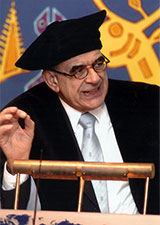 In 2002 I had resumed my position at the ISS. The Institute awarded me with an honourable degree on the occasion of its 50th anniversary in that year The laudatio was held by professor Bas de Gaay Fortman. In my address of thanks, I reflected on paradigm changes in development policy making, while in my inaugural address one year later (‘Collateral Damage or Calculated Default’) I highlighted the Millennium Development Goals – halving world poverty in fifteen years – and the politics of globalization. During my term in Sudan, I took leave from the ISS but I returned in 2007. I was granted official retirement in 2012, but continued lecturing for another five years.
In 2002 I had resumed my position at the ISS. The Institute awarded me with an honourable degree on the occasion of its 50th anniversary in that year The laudatio was held by professor Bas de Gaay Fortman. In my address of thanks, I reflected on paradigm changes in development policy making, while in my inaugural address one year later (‘Collateral Damage or Calculated Default’) I highlighted the Millennium Development Goals – halving world poverty in fifteen years – and the politics of globalization. During my term in Sudan, I took leave from the ISS but I returned in 2007. I was granted official retirement in 2012, but continued lecturing for another five years.
Since 2009 I also lectured as visiting professor at the UN University for Peace in Costa Rica (www.upeace.org). For a couple of years, I also gave courses at Amsterdam University College and Radboud University in Nijmegen and guest lectures at various universities in the Netherlands and abroad.
During those years I held a number of positions in national and non-governmental organizations, active in the field of development, peace, human rights and refugee assistance. (See this website: Curriculum Vitae) However, in 2017 I was struck by a severe heart attack. It was a narrow escape. I had to give up lecturing and to restrict other activities. Since then, I focus on writing essays and books.
Since around 1980 I had written many essays on development and globalization. Selections of these were brought together in four books: De kritische grens (1994), Catalysing Develoment (2004), Willens en wetens (2005) and Het pantser afleggen (2008). After my return from Sudan, I concentrated writing on conflict and peace, human rights and sustainable development. A number of these texts were collected in two books: Op zoek naar een nieuwe kaart (2015) and The Geography of Human Rights (2017). In other essays I discussed the changing political climate since the turn of the centuries and consequences for social democracy. (see this website: Books, Essays and Speeches). Thereafter I wrote books on the recent history of some countries and regions. In my book Strijd rond de Grote Meren (2018) I described developments after the genocide in Rwanda. In Suriname. Van wingewest tot natiestaat (2003) I discussed the decolonization of this country and its aftermath. Presently I am writing a book on countries in the Horn of Africa.
Personal
I am married to Tineke Zuurmond. We are living in The Hague. We have two children. Our daughter, Carin, has studied economics in Rotterdam. Presently she is working at the European Central Bank in Frankfurt. She is married to Paco Tur Hartmann. They have a daughter, Carolina (2004). Our son, Rochus, studied law in Utrecht and Washington. He is a diplomat and has worked in that capacity in Shanghai, Brussels, Kabul, Ramallah, Sarajevo, Uruzgan, Ottawa, Geneva, Bagdad and The Hague. He is married to Cara Jordan. They have two sons: Jonathan (2009) and Matthew (2013).
